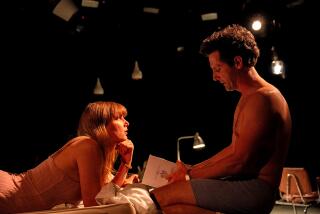Shakespeare Festival Proves More Than a Midsummer Nightâs Dream : Oregon: Ashlandâs 1993 season spanned eight months, with 733 performances of 11 plays in three different locales drawing 350,000 people to the biggest regional theater in the nation. This yearâs festival began last month.
ASHLAND, Ore. â As the Oregon Shakespeare Festival has grown into one of the nationâs premier regional theaters, this community of 16,000 residents has struggled against a tendency to let the stage overrun the streets.
There are motels, to be sure, with names like The Bardâs Inn.
But on Main Street, standing out starkly among Shakespeare banners and boutiques, is Harrisonâs Parts, an auto parts and machine shop with oil-stained wood floors, and fan belts and radiator hoses hanging from the ceiling.
âThere is no question that there has been a conscious decision on the part of Ashlanders to not be Disneyland, to not be a theme park,â said Mayor Cathy Golden. âWhatâs happened is the theater has grown with Ashland. It has matured with the community. Theyâve grown both individually and in parallel ways that complement each other. Itâs the secret of success of both the theater and the town.â
Ashland was founded by Ohio farmers in 1873 in the foothills of the rugged Siskiyou Mountains. Early on, residents had visions of a resort and developed the local mineral springs, whose sulfurous charms still can be sampled from lithia water drinking fountains downtown.
In 1935, a teacher at the local college, Angus Bowmer, started the town on a journey to the place it has become.
With a group of students and friends, Bowmer put on the festivalâs first plays during the Fourth of July weekend. Convinced that the plays would be a bust, the town fathers demanded that boxing matches be held during the intermissions to make sure tickets would sell.
The boxing matches are long gone, but the plays have grown in recognition each year. The company won a Tony award in 1983 for outstanding achievement in regional theater.
The festivalâs big break came in 1964, Shakespeareâs 400th anniversary, when it took three plays to Stanford University, where they were reviewed by critic Richard Coe of the Washington Post.
The American Theater Critics Assn. brought its 1985 convention to Ashland, helping to celebrate the festivalâs 50th anniversary.
Last year, the festivalâs season spanned eight months, with 733 performances of 11 plays in three different theaters drawing 350,000 people, making it the biggest regional theater in the nation.
One follower, Kristin Kraus, actually likes getting up at 5 a.m. to stand outside the box office for extra tickets.
âIt becomes this little community,â said Kraus, 29, who has been coming to the festival since she was 12. âYou end up talking about your whole life history to complete strangers. Itâs really embarrassing, but thatâs OK, because thereâs nothing real about it anyway.â
âYeah,â said her friend, Denise Mauro. âItâs like this fictitious land.â
Both local merchants and the festival have resisted becoming a Shakespeare fantasyland, however.
Sheila Drescher, a partner in the Bloomsbury Books shop and a member of the festivalâs board of directors, remembers a time about 15 years ago when there was a restaurant called Hamletâs Roost and a shop called As You Like It.
A Tudor facade showed up on a prominent wall of one of the buildings on Main Street.
âIt was so cutesy,â she said. âPeople were against it.â
But the facade gradually has come down. Now only one panel of white stucco and dark brown timbers survives as a kind of a reminder of what could have been.
The 500-member company has remained committed to performing the complete works of Shakespeare, as well as controversial modern pieces.
âWe donât do plays on the stage in an English accent,â said Pat Patton, assistant artistic director. âItâs not a theme park. Itâs a serious artistic endeavor.â
Politically, Ashland stands out as a liberal enclave in conservative southern Oregon. Voters rejected an anti-homosexual measure by 3-1, although it won wide support elsewhere in rural Oregon. The statewide measure was defeated in 1992.
âAshland has a nice mix of that small-town feel and the benefits of a city,â said Katrina Seibert, manager of the Winchester Inn bed and breakfast. âPeople are more artistic and less geared to career. I think most people are here because they like living here and they are finding a way to make it work.â
One way people make it work is by starting other theaters. Four have spun off the festival.
âObviously, Shakespeare is the draw, and Shakespeare is what created the theater energy in the town,â said Jim Giancarlo, a former Shakespeare Festival dancer who started Oregon Cabaret Theater in a converted church. âItâs the theater, but itâs also the town.â
Golden traces much of Ashlandâs appeal to voter decisions to control strip development, support schools, make the town pedestrian-friendly, promote bicycle riding and boost recycling.
But above it all hovers Shakespeare, especially for visitors. Ask parking patrol officer Matt Caswell as he leaves yellow chalk marks on the tires of cars.
âThe biggest question Iâm asked falls between where the Shakespeare box office is and where is the best place to eat,â he said.
More to Read
Sign up for Essential California
The most important California stories and recommendations in your inbox every morning.
You may occasionally receive promotional content from the Los Angeles Times.










